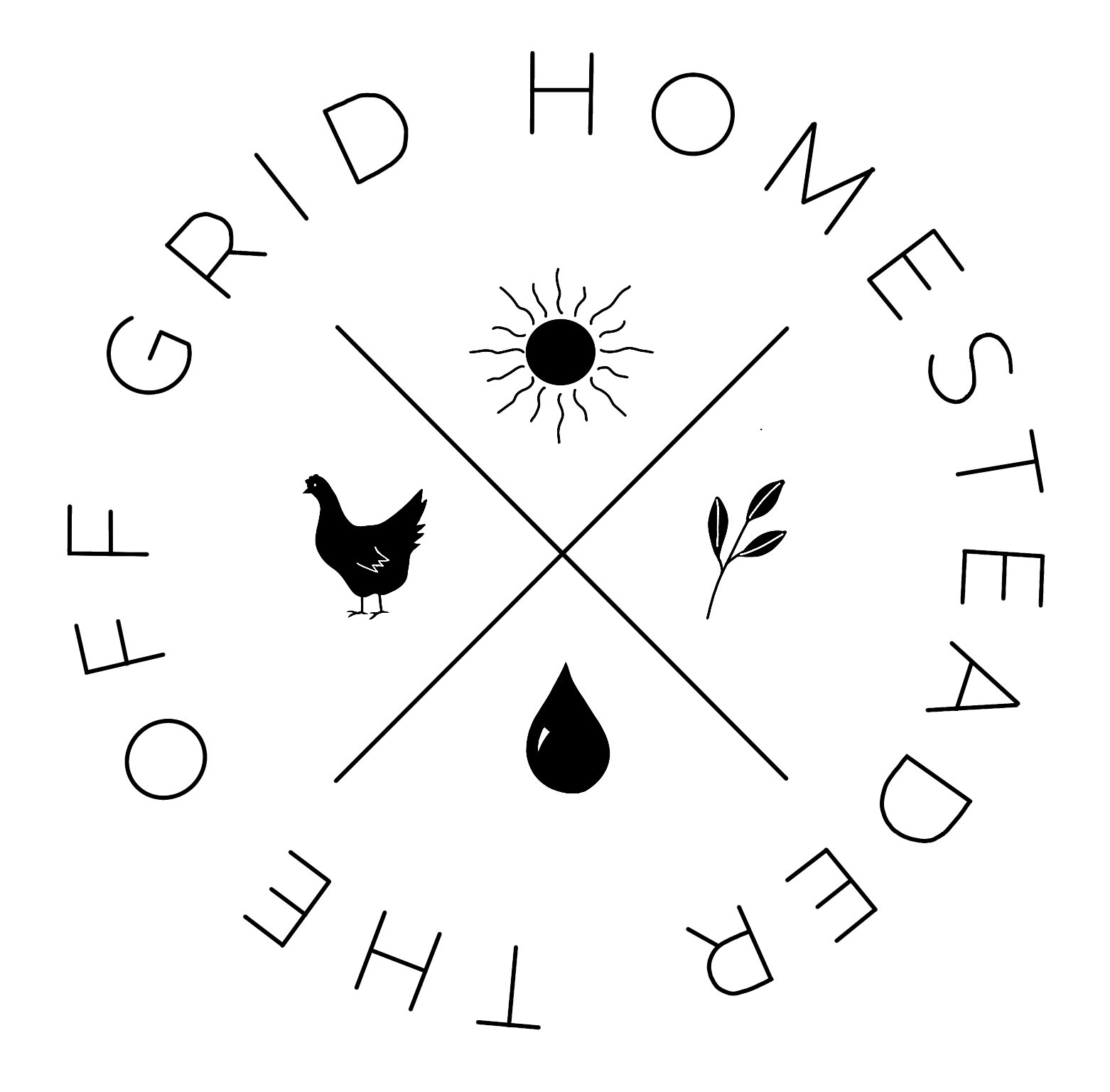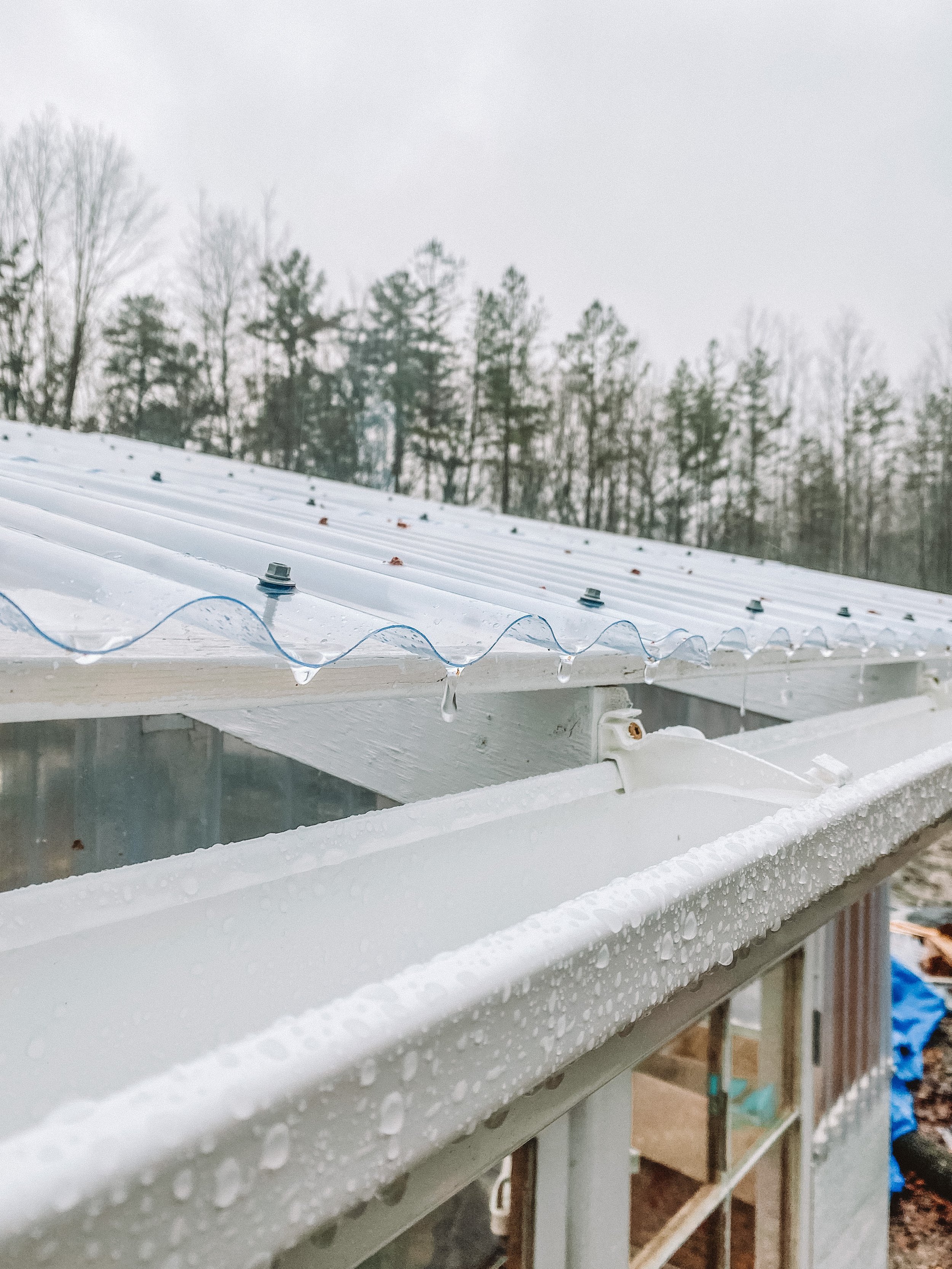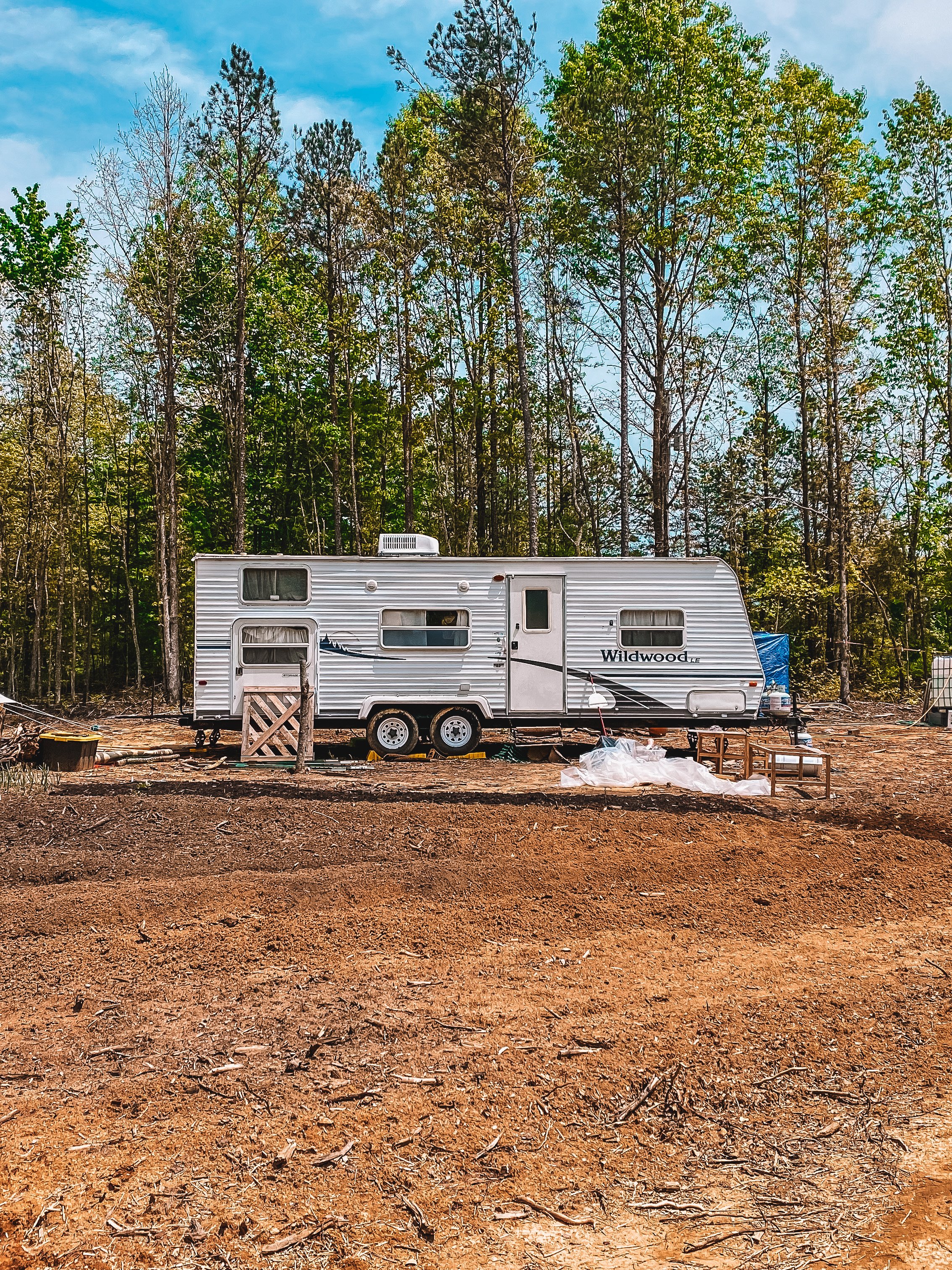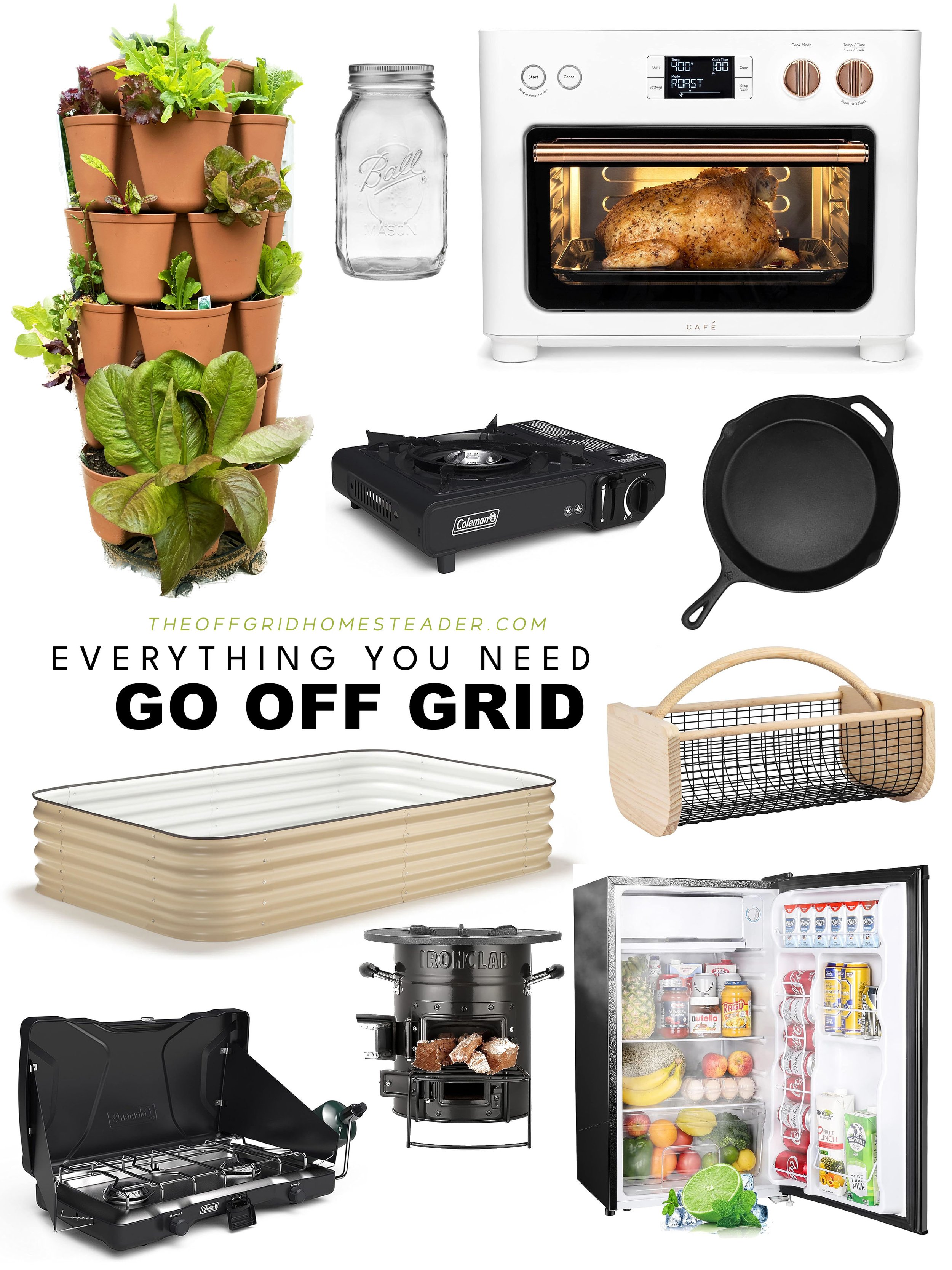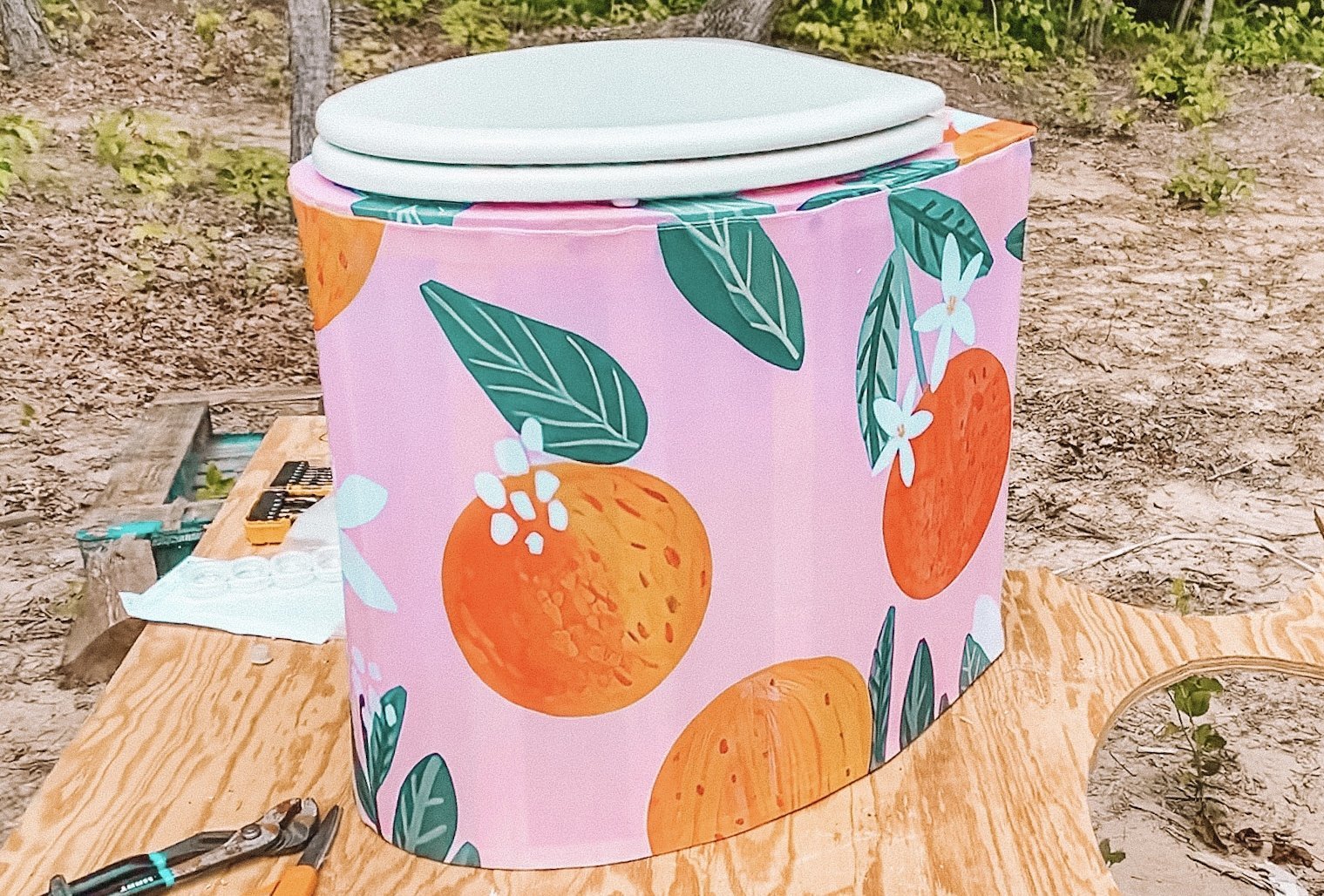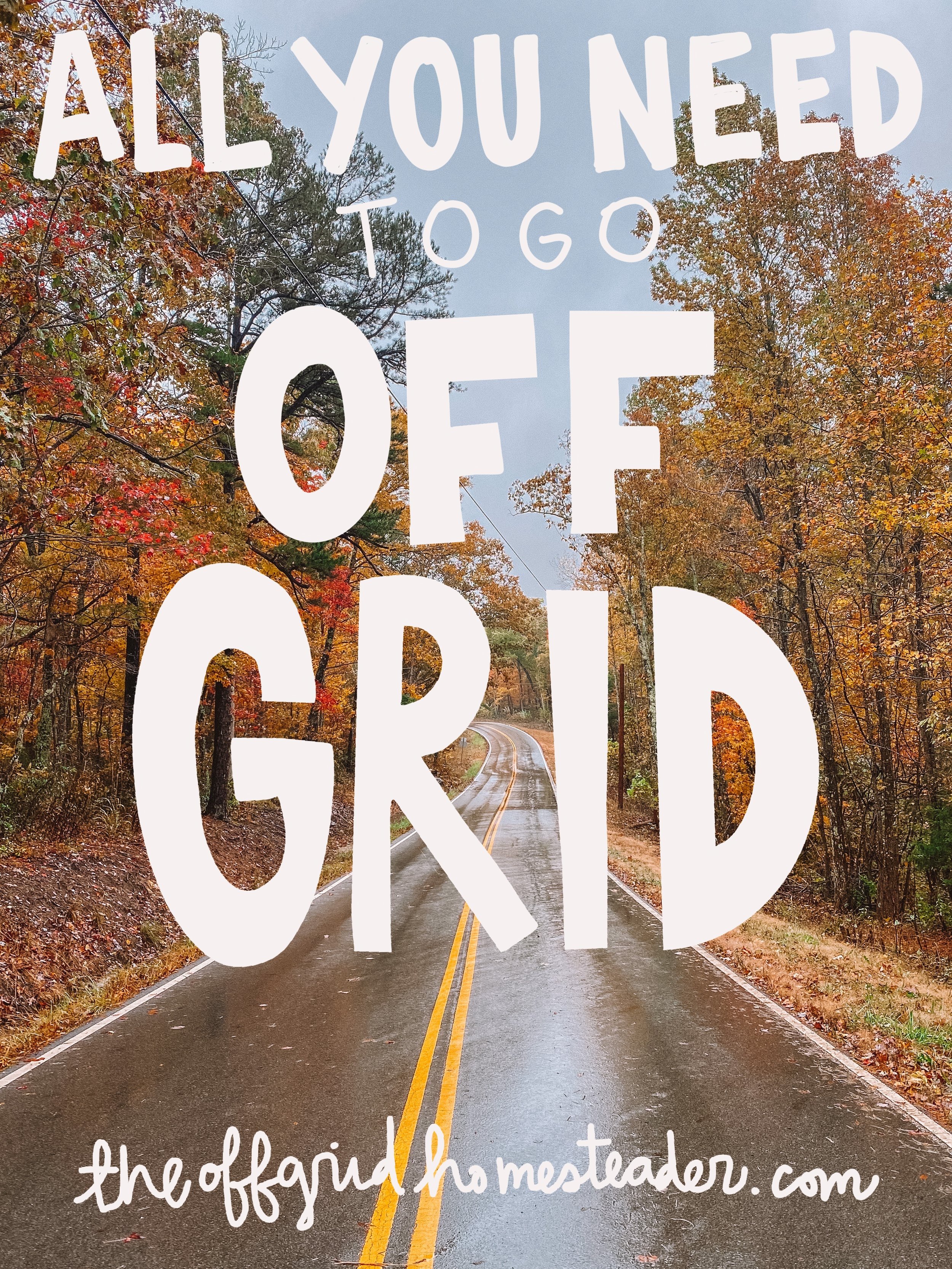Everything You Need To Go Off Grid
When we moved off grid in October 2021, we didn’t have much of a plan. We set foot on our bare land with our camper, a Jackery 1000, a Champion Generator, a full water tank, and a sparkle in our eyes. We thought we had a plan, but looking back, we had absolutely no idea what we were doing and any semblance of a plan went out the window almost immediately. We truly lucked out because everything ended up working out okay, but under no circumstances would I recommend anyone take our path. If you don’t have land yet, check out the post below!
The Ultimate Guide To Buying Land
If you are us in October 2021 (or anytime before that) you are probably wondering what the heck it would take for you to go off grid. And I’m here to tell you that that is a very valid question/concern. If we had to do it all over again, this is what we wish we would’ve known…
A Good Attitude, Work Ethic, & Adaptability
Like anything in life, if you have money, this whole process will take a lot less time and it will be easier. If you’re like most of us and aren’t rolling in the dough, maybe even living paycheck to paycheck, you’re going to need to prepare for some rough days ahead. There were times on our journey when we wanted to quit and there have definitely been tears. I don't ever want anyone to look at our life and think that we have it all together or that we have done everything right. There have be lots and LOTS of tears over these past two years. This lifestyle is not for the faint of heart. But you’ve got to remember why you are doing this. This is what will help you press on. We’ve worked hard and pushed through the hard times because we know this is what we truly want right now.
And when nothing goes as planned (because it won’t) you have to be adaptable. I think our biggest growth on this land in the past 2 years has been adapting. And it’s the best thing you can be when living off grid or building something from the ground up. If you don’t go into this journey with a good attitude and a willingness to work hard and adapt, it will be harder than you could even imagine and you might even give up.
Water
Water is the most important thing you need to figure out before going off grid because we all require it to survive. The most important things you need to figure out are how you are going to get water, how much you will need, and if you need to filter it, what filter you will be using?
If you are moving to land that has a water feature like a river or stream, it could be as simple as collecting that water and filtering it. If where you will be living has a working well, consider yourself lucky! Your water has already been figured out for you.
If you live in a place where it rains a good amount, rainwater collection could be the route. In this case you will need vessels to collect rain water and systems for collecting. This sounds complicated but it can be really simple. Check out our post below for all the ins and outs of rainwater collection.
How To Collect Rainwater & Figure Out How Much Water You Need To Survive
If none of these seem like the route for you, you can always bring water onto your land. It is not uncommon to tote a vessel into town to fill up with water and bring back to your property for usage. You can easily purchase small amounts of water for drinking, cooking, and cleaning dishes. This is our least favorite route as it takes a lot of time/energy, but it can be done!
We truly were blessed because within a week of living on our land, our new neighbor very kindly offered us unlimited access to their water across the street. Our temporary water problem was solved quickly and we consider ourselves very lucky. Our long term plan is to do a rainwater collection system, but since our neighbors were so generous, we have put that project off until other more pressing matters are dealt with. We do collect rainwater for our outdoor bath house, which contains a sink and shower, and our chickens and cats all drink from their rainwater systems we have set up.
Shelter
Second to water is shelter. You will need a place to live. Assuming that you have already figured out the owning land situation, the truth is that any shelter will work. If you still need to buy land, check out our post: The Ultimate Guide To Buying Land. Will you be setting up something before you move off grid or will you be building as you go? Either way you will need something ready the second you arrive.
The most budget friendly route would be something like a tent. This however might not be what you are comfortable with. I think in the beginning I would’ve said I would live in a tent for awhile, in fact, we were even planning on setting up a living room space in a tent we already had. But looking back I know I would've been miserable. Our first month here was the most humid time I’ve ever seen. Everything outside was soaking wet every single morning and it was kind of the worst. If this is your only option and you think you can do it- go for it! But for anyone else, you might want to consider other options.
I’ve seen pretty affordable options for campers online on places like Facebook Marketplace, and this is likely the next best thing for someone on a small budget. We were lucky enough to have some friends with a camper that were happy to loan it to us over the winter when they wouldn’t be using it. Maybe you have a friend or family member with a camper willing to let you borrow one? Or maybe you already have one.
If you have a little bit to spend on shelter, you could consider ordering a shed to be delivered to your property that can then be turned into a temporary living space. If you go this route, make sure to check your local laws. Many states do not allow sheds to be turned into homes. And check out our post: What To Consider Before Turning Your Shed Into A Home.
If you have a little more of a budget or are fine with getting a mortgage, you could look into ordering a manufactured home. This is the simplest and fastest route to getting a very comfortable shelter situation on your land.
No matter what sort of shelter you choose to live in, make sure it’s something you will be somewhat comfortable in for a long period. Because no matter how much you plan, things always end up taking longer than you think. And remember, the larger the space you have, the more energy it’s going to take to power that space.
Power/Electricity
Unless you plan on living Little House on the Prairie style, you will need some source of electricity. I have found that many people on the internet think that living off grid means not having electricity. This is not true. Off grid literally means off the electrical grid. So while the whole point is not getting your electricity from your city or county in a traditional way, you can still have electricity in an untraditional way. Minimizing your electrical needs as much as possible will allow you to get away with less electricity. This is helpful if you are trying to spend as little as possible. Make a list of the things you will be using while off grid and figure out how much power each of those things take. This will give you a sense of how much power you will need to generate for yourself.
A generator can provide you with a lot of power but it also will use a lot of fuel. It also only gives you power when it is running. A solar generator can store power and have it ready for when you want to use it. A battery bank can store the power from the generator for later use. The same is true for a solar generator, however the amount it can store is limited. A battery bank can be custom made and added onto and store almost unlimited amounts of power. So you could start with one battery and add on as you go/ can afford it.
We started out using a fuel generator and our solar power bank because that is what we already had. We charged our solar power bank when the fuel generator was on and tried to use everything we needed to during that time. When our fuel generator was off, we relied on the solar generator. Soon after that we set up our simple solar system in order to get a little bit of our power from the sun. This worked out and is exactly what we did for about a year. Now we operate about half on solar and half on generator. We have slowly transitioned to solar power over the past year and are about to install more solar panels to hopefully be fully transitioned over to solar power only. Stay tuned on more info about that!
Food Storage & Cooking
You will need a way to store food and keep it fresh and safe from critters. In the beginning this may look different than what you are used to. We started out with a mini fridge that we ran off of our Jackery 1000. Depending on how large your off-grid crew is, this may not be sufficient for you. However, the energy requirements are considerably less than a full size fridge. You could also go the route of not having a refrigerator at all. You could start with a cooler or rely more on canned goods and dehydrated foods. These options may not be desirable but you gotta do what you gotta do.
If you are someone that has the option of living in a camper or you have enough money to start out with a house in the beginning (or you already live in a house), obviously you will be able to have a standard refrigerator. In these cases you might be interested in a deep freezer to be able to store more food at a time. A small deep freezer really doesn’t use that much power and can provide ample space for storing bulk food, or preserving the food you grow yourself.
In all instances, it’s not a bad idea to start a garden. It doesn’t matter how big or small, producing even the smallest amount of food is not only satisfying and gratifying, it helps you get one step closer to taking something in your life into your own hands. And what is off grid living if not taking your life into your own hands?
As far as cooking goes, the simplest setup is a gas camp stove with one burner. You can also get a 2 burner camp stove. When you get into using electricity to cook your food your power needs go up drastically. Once we had our power system set up, we got a really small oven/ air fryer in place of a regular sized oven.
If you have a fire going outside you may consider cooking over the fire. It takes some getting used to but can save you some fuel. The same goes with a wood stove. If you are going to have one and use it regularly in the colder months, you might as well get one that you can cook on! There are also rocket stoves that aren’t too costly that can help you cook outdoors rather easily.
Just remember that the more extensive your food/ cooking setup is, the more power you will need and the more time you will spend cleaning up.
Bath/Toilet
You’ve got to go to the bathroom somewhere. You could set up a simple 5 gallon bucket with a toilet seat on top and call it a day or you could just dig a hole for an outhouse. These are certainly the cheapest routes. As with everything else, please check your local laws/zoning/codes to see what the rules are on having composting toilets and/or outhouses.
We wanted to have something a little more comfortable so we DIYed a composting toilet. We really like this system the best. Well I guess our favorite option would be a flushing toilet but that is not a requirement to go off grid. If you want to read more about composting toilets and all the options we have a blog post that will tell you everything, including what different things we’ve tried.
If you don’t want to go the DIY route there are composting toilets that are a little pricey (especially when compared to DIYs) but that come all set up in one unit like the Nature’s Head Toilet.
In terms of showering, if you want to go really bare bones or are on a tight budget you can do cold showers and you don’t need much to make that happen. You can set up a tarp for your shower facility and be done with it. Heck, you could just shower in the open if you live in a private enough place. If you want a heated shower you can get a solar shower. This is definitely the least expensive option but can be iffy in the winter. Another option would be to spend a little more and get a portable heater like this.
But I’m gonna let you in on a secret- you don’t have to bathe at home. Depending on where you live you may be able to join a gym and shower there. That’s exactly what we did. Showering is the number one thing you will use water on. Even though we had unlimited water access, we didn’t have an indoor place to shower. So in the winter we shower at the gym. No outdoor winter showers for us! But if you are into that- go for it. (Update: We now have a permanent outdoor semi-enclosed bath house that we have been showering in even on the coldest days. TBD if we make it through the whole winter without a gym shower!)
Heating/Cooling
Depending on where you live, you may consider needing heating or cooling. And if you don’t need one, chances are you will need the other. Choosing a mild climate would be your best option, but a lot of these areas are more expensive. We live in a place where we have to have heat in winter and cool in summer. Spring and fall, we open the windows and enjoy the breeze.
In terms of heating, a wood stove is our favorite option because it doesn’t use electricity and we live on a property with TONS of trees. Minus the cost of the stove (which can be a lot) we can get our heating energy practically for free. Newer stoves are way more efficient as a lot of them go through rigorous testing with the EPA. A lot of wood stoves also double up as a cook top to heat water or do small amounts of cooking while it’s heating your shelter.
Another option is to heat by propane. These heaters are not our favorite option because they are a wet heat and use a lot of propane. We do have a Mr. Heater buddy that can be supplemental to our wood stove or used in a small space if needed, but it is mostly there just in case. This year we have explored using the buddy heater when a fire would be too much and/or we just need heat for a couple hours. For that, it has worked great! We are big fans of having multiple options for heat and anything that you need to survive.
For cooling we have a mini-split. What is great about this mini split is that you can install it yourself and don’t need an HVAC professional for installation. It can also heat our house but we have rarely ever used it since the electrical consumption is so high. But it is nice to have the option when it’s the coldest time of the year. Any day that we don’t have to use the air conditioner, we make sure to open all the windows. We use a fan to help move air from one window to the next and can keep it pretty cool in the house when it isn’t scorching outside.
Another thing we have for cooling is our stock tank pool. I know this sounds crazy but sometimes when it is just too hot, there’s no cooling our house to a comfortable temperature. We hope to address that in the future. But for now we have a stock tank pool and can go sit in the water to cool down. And some days that’s what we have to do. We also have an awning and a small porch to escape from the sun and sometimes that is the best way to keep cool.
Want to learn how to make your own stock tank pool? Check out our other website: Stock Tank Pool Authority.
Laundry
When you are starting out you may do your laundry at a laundromat in the town nearest you. That is what we did. Some of you may be so remote that is not an option. But for us, it gave us a quick solution. Just like everything else your options depend on your budget.
Your most low budget option is old school and maybe even how your parents or grandparents did their laundry. You fill a sink or basin with water & soap and wash by hand using a washboard. Then after rinsing with clean water, you would hang to dry on a clothes line. Your clothes line can also be simple rope tied between two trees or can be a more advanced and user friendly pulley system that we like to use. If you are doing a pulley system you will quickly learn you need these separators. Another clothes drying option are these clothes drying racks that can be used indoors or outdoors. This particular one folds up small and can be stored easily.
A mid priced option for washing clothes are these clothing spinners. There are several different options available. I’ve even seen people use salad spinners as a part of their laundry routine. These are great options for delicates regardless of your on or off grid status. You would probably have a hard time washing a pair of jeans in one.
And last, the most expensive option is the more traditional types of washer & dryers. For most people these will draw too much water and power to be a viable option. We have this apartment sized washer and love it. It still uses a good bit of water but it’s really nice to have. We also have this 120 volt dryer that doesn’t use nearly the amount of power that a traditional dryer would use. We go back and forth between using the dryer & the clothesline depending on how much energy we can use that day. I find I like to dry smaller items, like socks and underwear, that are a pain to hang on the laundry line and would dry quickly in the dryer. But line drying is really simple and easy and we don’t really have too many bad things to say about it.
Communication
While the allure of isolation is a significant part of what people think off-grid living is, reliable communication remains crucial for safety and maintaining a sense of community. We personally are not living off grid to live in isolation or get away from people. It is very important to us to stay connected to the world and our neighbors, friends, and family.
Cell phones are the most obvious way of communicating off grid. You can have a fancy smartphone or a basic flip phone, but being able to communicate with others is important. When looking for land you may want to pay attention to your cell service. You can buy signal boosters to help improve a poor connection. You can also get into ham radio or have two way radios as back up. In terms of receiving important information, this weather radio is nice to have because it has multiple ways of being charged.
Satellite internet is often the go-to choice for off-gridders, offering relatively high-speed connectivity in remote areas. We don’t have any experience with Starlink but have heard good things from people who use it. We are lucky enough to have fiber internet thanks to a government grant to our rural area. While internet isn’t a requirement for living off grid, it is great to have. Internet can allow people like us to actually be able to live off grid in the first place since our online businesses are how we were able to buy land. You can be the judge for yourself if you want or need internet in your off grid life, but know most people in the off grid community don’t see internet as a part of “the grid” as it is not a public utility.
With every off-grid system it is best to have multiple options for each system. When you are first starting out and/or living on a budget you will likely just start with the basics and add on as you go. One day your generator will need a tune up right when you desperately need it for power. In that moment you will learn exactly what you need to do so you aren’t in that situation again.
Living off grid can bring satisfaction, but it also comes with challenges. It can feel lonely, test your resilience, and be financially demanding. You may even long for the simplicity of your past. Something like a flushing toilet might begin to feel luxurious to you. However, these struggles don't diminish the overall rewarding experience. The best thing you can do is research your heart out and lower your expectations. Things will take much longer than you thought, but that’s okay! I know it’s cheesy but living off grid is truly about the journey, not necessarily just the destination.
